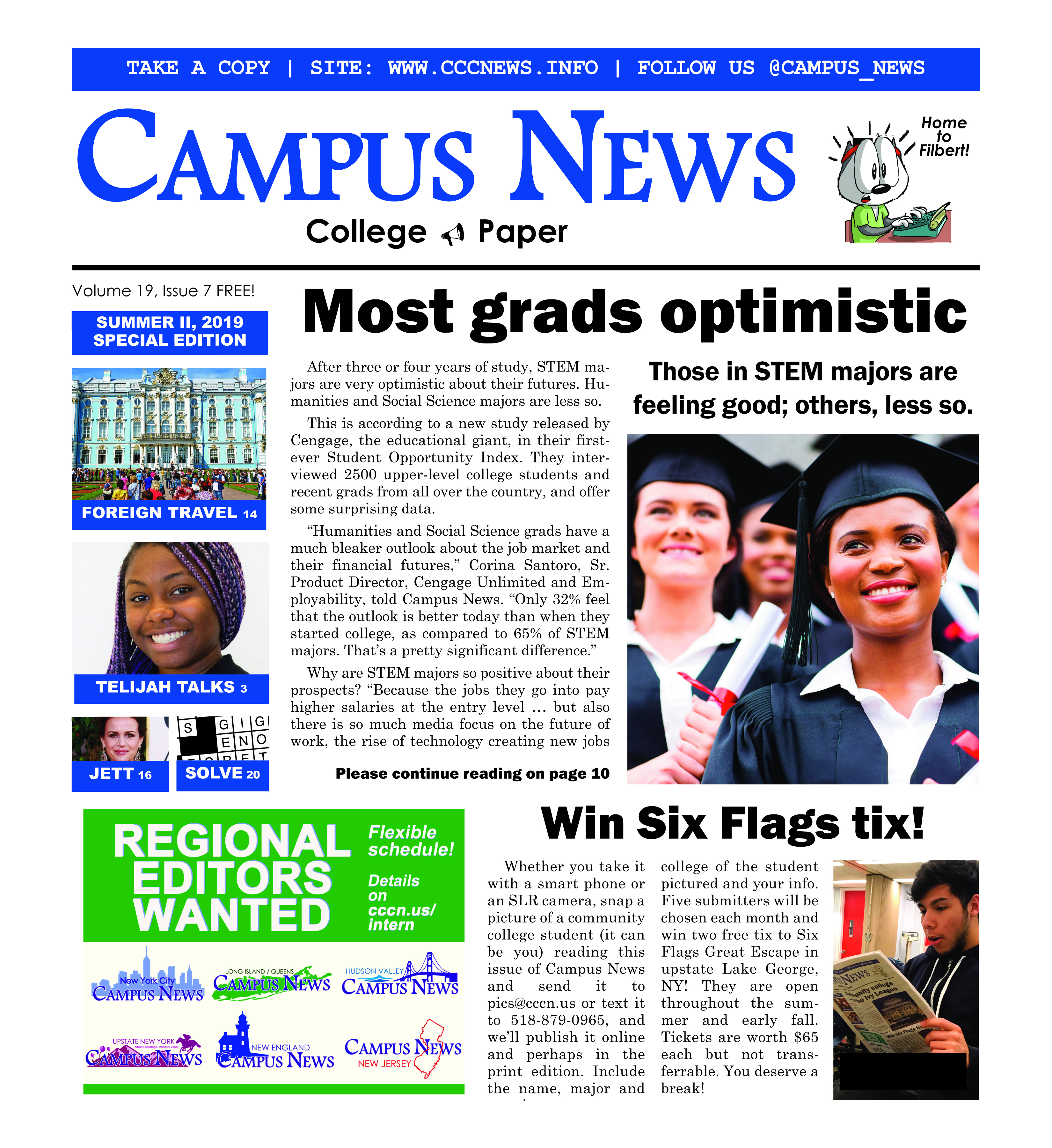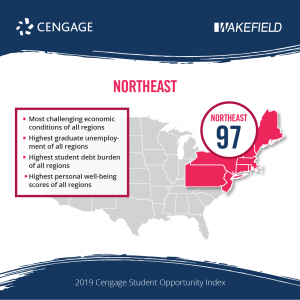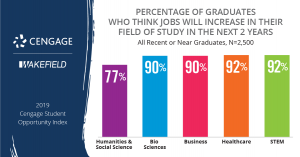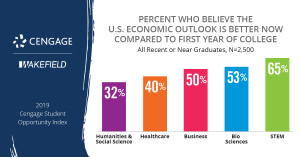By Darren Johnson
Campus News
After three or four years of study, STEM majors are very optimistic about their futures. Humanities and Social Science majors are less so.

This is according to a new study released by Cengage, the educational giant, in their first-ever Student Opportunity Index. They interviewed 2500 upper-level college students and recent grads from all over the country, and offer some surprising data.
“Humanities and Social Science grads have a much bleaker outlook about the job market and their financial futures,” Corina Santoro, Sr. Product Director, Cengage Unlimited and Employability, told Campus News. “Only 32% feel that the outlook is better today than when they started college, as compared to 65% of STEM majors. That’s a pretty significant difference.”
Why are STEM majors so positive about their prospects? “Because the jobs they go into pay higher salaries at the entry level … but also there is so much media focus on the future of work, the rise of technology creating new jobs and employment opportunities for new graduates.”
But Santoro said the good news is also a bit ironic, because the skills employers also state they want in employees are softer – reading, critical thinking, communications – that the Humanities and Social Sciences are better known for cultivating.
“These are actually the skills that are most in demand in all industries.”

Overall, Humanities and Social Sciences majors, while dour, were also the most realistic, and their answers most closely reflected results of other national studies. They knew it would take them longer to pay back their loans, and that they may have trouble getting a place of their own at first, for example. Students in the Northeast had the most to worry about, as cost of living is higher (though the job market is also relatively strong here). Other studies suggest Humanities and Social Science grads tend to start off slow, but their incomes pick up mid-career. All hope isn’t lost.
Cengage officials said Humanities and Social Science students aren’t always as informed about specific employment options. Colleges could do a better job with that.
Overall, though, the vast majority of grads are very confident in their ability to get jobs relatively quickly. The Northeast was most optimistic in that regard, with 95% indicating so, vs. only 84% nationally. Still, Northeastern students felt they may have to leave their hometown in order to afford housing (73%), and 56% said they will be saddled with student loan debt; average being nearly $25,000.
The study looked at three other types of majors: Business majors feel most confident they will land a job in their field (97%); Healthcare majors are the most likely to be working in their field of study (69%); and Biosciences majors are most likely to owe high amounts of debt (over $30,000).
 In another facet of the study, students who identified as Republican were giddy about where the country was headed, while Democrats were much less sure. Ninety percent of GOP students were optimistic about their futures, compared to 79% of Dems. Economic outlook for the country: GOP students are 73% upbeat, while Dems are just 39% upbeat. Surely, a lot of these perceptions have to do with Trump winning the presidency in 2016.
In another facet of the study, students who identified as Republican were giddy about where the country was headed, while Democrats were much less sure. Ninety percent of GOP students were optimistic about their futures, compared to 79% of Dems. Economic outlook for the country: GOP students are 73% upbeat, while Dems are just 39% upbeat. Surely, a lot of these perceptions have to do with Trump winning the presidency in 2016.
STEM majors and GOP-affiliated students also reported better feelings about their love lives, mental and physical health, job prospects and whether or not they will have a better quality of life than their parents.
I suggested that STEM majors may be more likely to be Republican, but Santoro said the data doesn’t wholly correlate that assumption.
How students feel depends upon whom you ask, but there clearly are trends.

Santoro said that Cengage, working with Wakefield Research, will use this year’s study as a benchmark for future annual surveys, to gauge if student outlooks are improving or not over time.
She said Cengage is doing this work because of their focus on content for colleges, to better help them prepare meaningful material to help link majors to jobs. “Our ultimate goal is to help students achieve their goals.”
How do you feel about this? Write us at talkback@cccn.us to have your voice heard!





Facebook Comments